Librarian Jess Starr brings us highlights and insights from He Puāwaitanga—Growing Communities, Developing Knowledge and Building Confidence, the School Library Association’s 2024 conference.
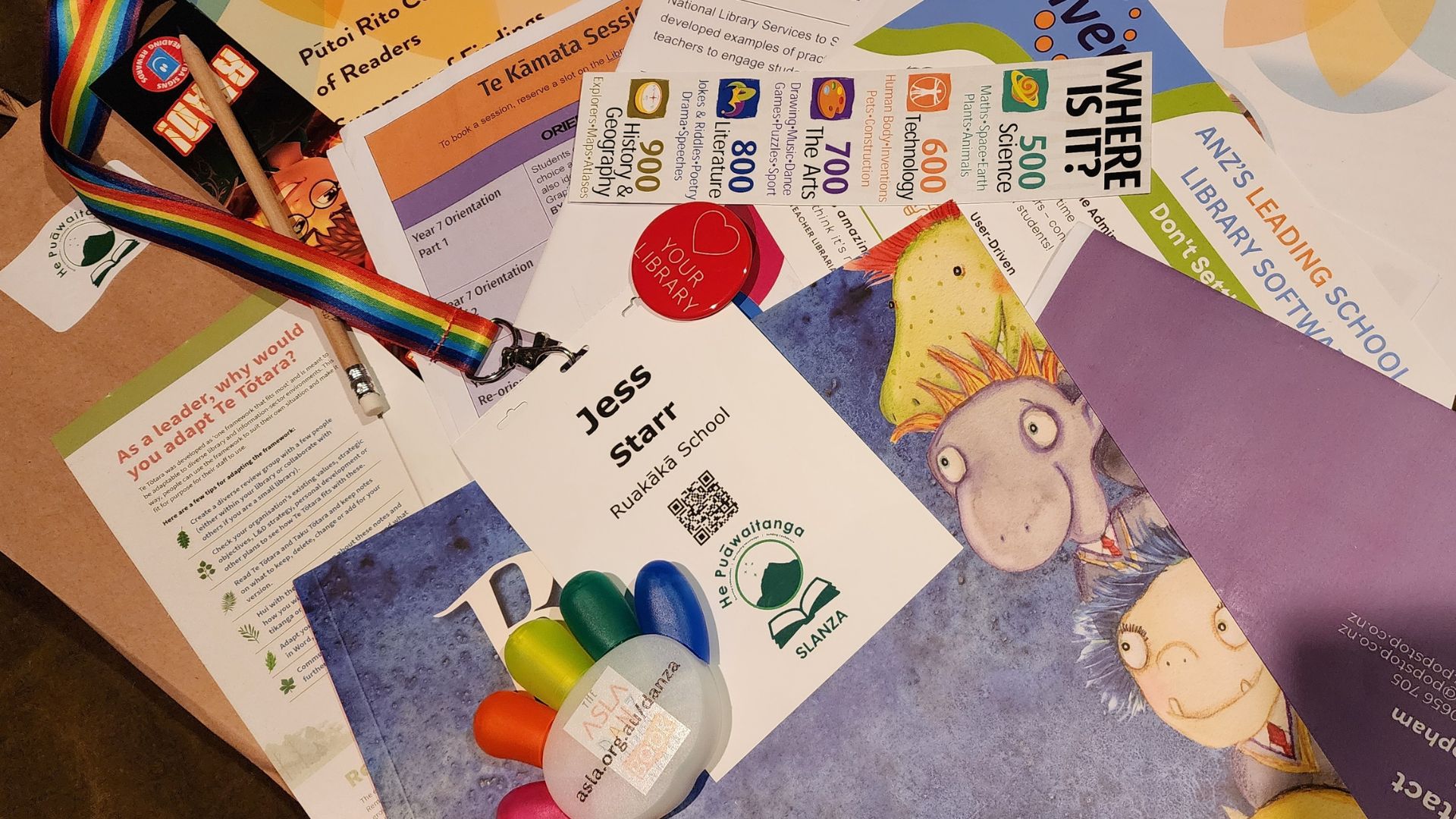
My tickets were booked, my cardigan was packed. I’d been practising my shushing all week and was ready to fly south to join over 200 of my fellow school librarians at the 2024 School Library Association of New Zealand Aotearoa—Te Puna Whare Mātauranga a Kura (SLANZA) national conference, at Christ’s College in Ōtautahi Christchurch. This was the first national conference I had had the opportunity to attend and I was extremely excited to spend these three days with my school librarian community.
The conference was held at the end of September. The theme of this year’s conference was ‘He Puāwaitanga—Growing Communities, Developing Knowledge and Building Confidence.’ The theme was well represented across the conference, from the keynote speakers and workshops, networking opportunities and author panel, to the fabulous dinner quiz night and field trips to local libraries. In addition to the planned theme, I believe ‘connections’ was also a theme that emerged.
The school library is the hub and the heart of the school …
The school librarian is in a unique position in the kura. We have a whole school view, connecting with students from all years, and we are tasked with creating a space to encourage literacy and support wellbeing. The conference buzzed with librarians gaining confidence in the importance and impact of our role, and with the excitement of new ideas.
The SLANZA conference team secured amazing speakers from Aotearoa and Australia. Each speaker brought a different contribution to the conference theme. The first speaker was Dr Hana O’Regan, who is a champion of language and equity across the globe, but is specifically focused on the revitalisation of te reo Māori in Aotearoa. She spoke about how deliberate and systematic attacks on native languages, be it Welsh, Irish, or te reo Māori, have an enduring impact on cultural identity and society as a whole. These historical actions have created narratives and biases that still exist today.
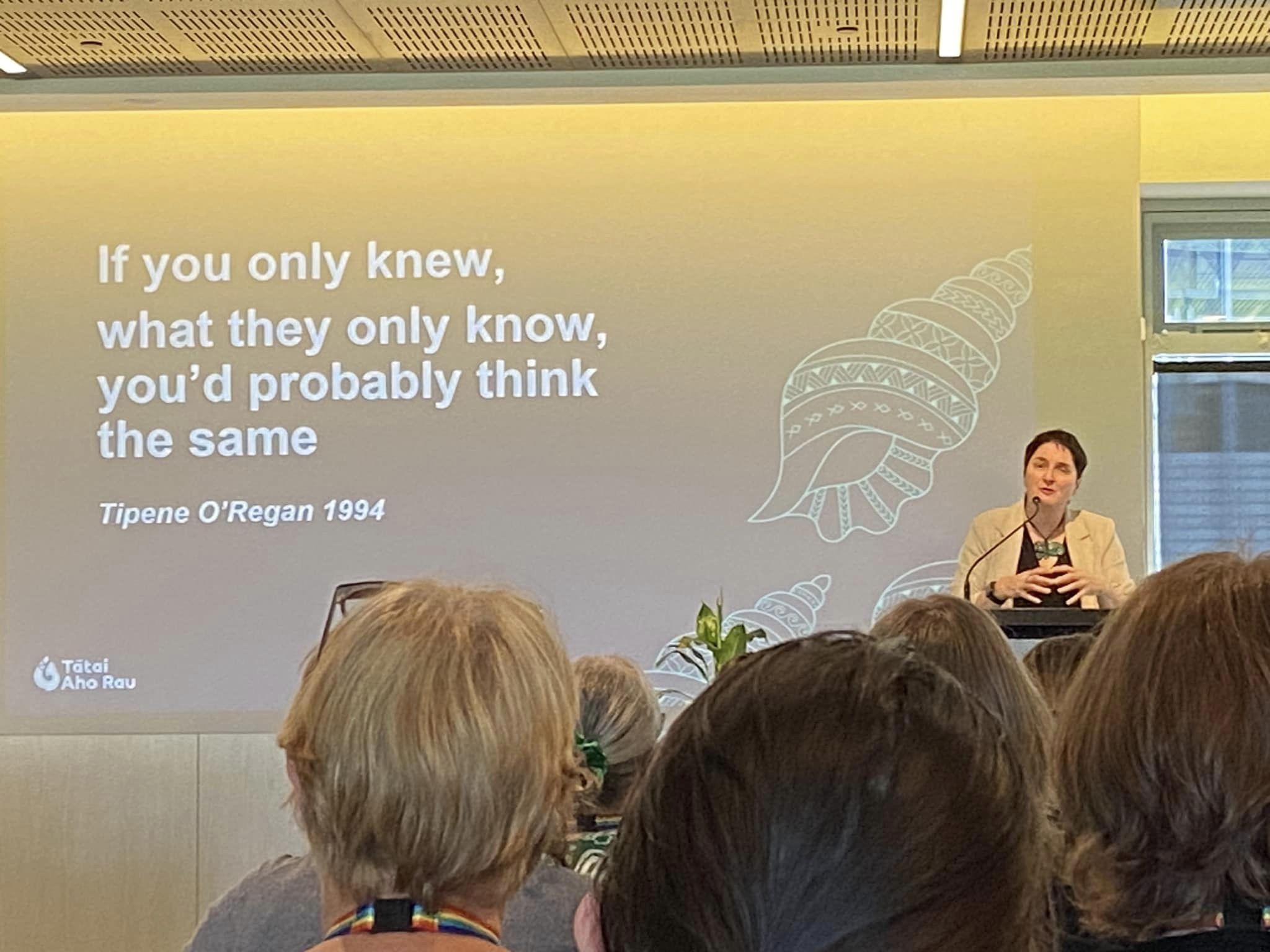
While this may seem to be a topic far beyond the scope of the school library and librarian, it is not. The school library is the hub and the heart of the school and often the wider community. One of the most important roles of the school library is to be a safe and inclusive space for all of our users. It is up to the librarian to ensure that our spaces meet those needs. Understanding how we got here, and how our own biases, as well as those from the world outside our library and our kura, impacts our tamariki and supports us to create this safe space. With this knowledge we can build equity and empathy in our spaces. We can be that one person who truly sees and connects with that one student, and that connection can make all the difference in the world.
Dame Sue Bagshaw, a doctor, senior lecturer and long time advocate of youth health and wellbeing, carried forward the idea of the library and librarian’s active role in pastoral care for our tamariki. Libraries in our kura and across our communities offer the space for face-to-face interaction with our rangatahi, but it is the librarian that is the mauri of the library.
… it is the librarian that is the mauri of the library.
Dr Margaret Merga and Gabrielle Mace focused on reading for pleasure and the importance of creating a reading culture in our schools. There are many well established benefits to being a reader, from increased vocabulary to building mental endurance in a world of 30 second TikToks. Dr Merga and Gabrielle focused on the librarian’s role in developing a reading culture, with a huge piece being the importance of reading role models. They offered tangible steps to grow the reading community in our kura. The ‘how’ is often a challenge for librarians, we understand the need, but it can be difficult to take these ideas to senior leadership. Developing knowledge around the ‘how’ helps build confidence in our professional abilities to create a reading culture.
The conference team also organised dozens of workshops for delegates to attend—with so many great opportunities, it was very hard to choose! Like the speakers, the workshops supported the overall theme of the conference. Many of the workshops I attended continued with the ‘how to’; the nuts and bolts and ideas on how to build our reading community, maximise student engagement with our libraries and staff engagement in our ability to support with building a reading culture, coordinating teacher resources, and supporting digital literacy.
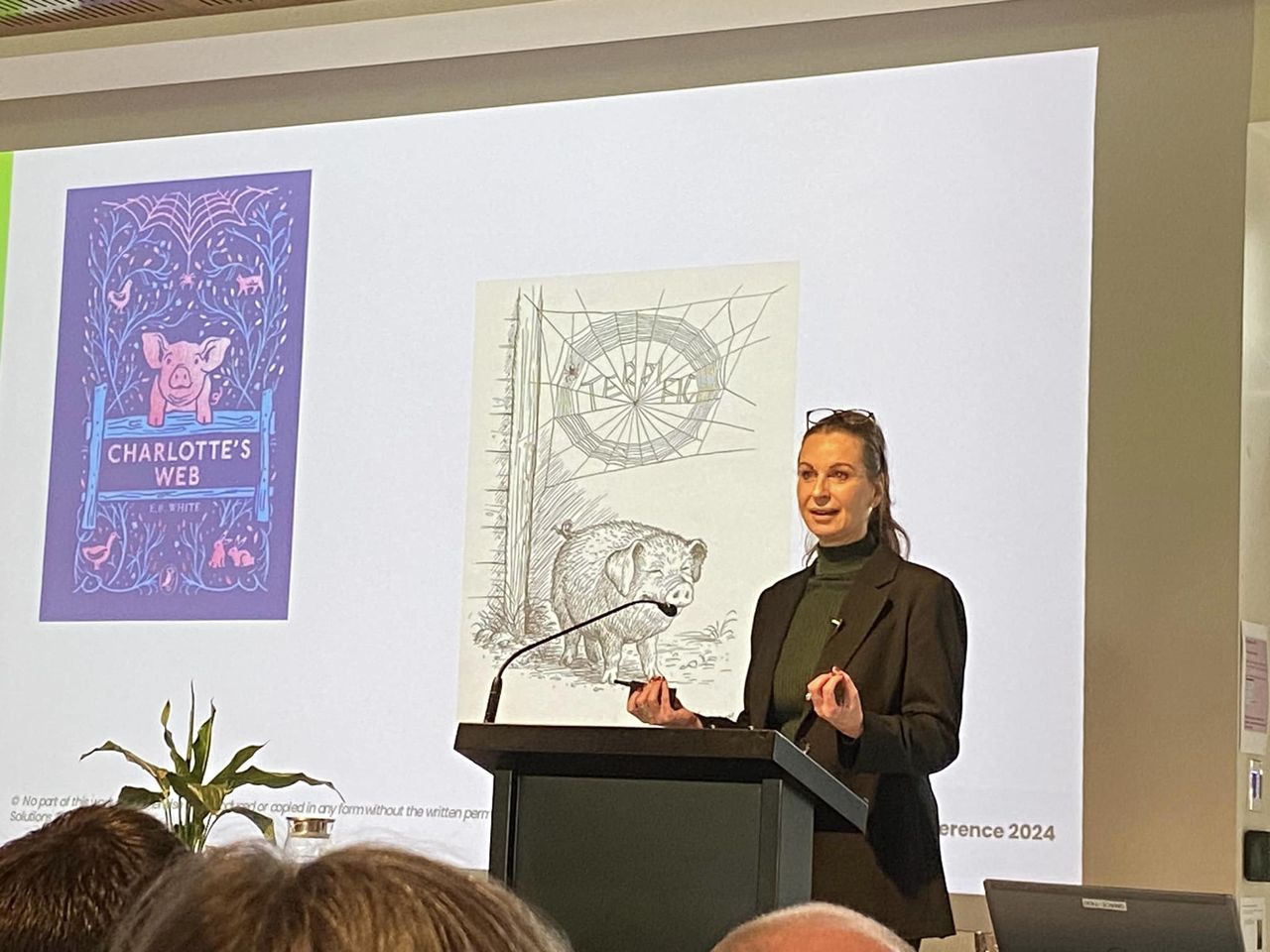
One workshop of particular interest to me was ‘Fostering Inclusivity and Respect: the role of catalogue records’ with Renate Beilharz and Anthony Shaw. There is a movement amongst librarians across the globe to update the way library records are catalogued, considering inclusivity and current world views. This includes reconsidering keywords, tags, topics, and the Dewey Decimal System. In library cataloguing software, scanning the ISBN pulls metadata from multiple databases, some paid and some free, from across the globe, however the majority of these are from the US and the UK. This means that words and concepts familiar to us in Aotearoa are not connected to our books. Further, through the Dewey Decimal System, many of our books, especially te ao Māori titles, are not classified correctly.
Renate and Anthony discussed ways that libraries and cataloguing services are changing this. In New Zealand, the Māori Subject Headings Project, which is jointly sponsored by LIANZA, Te Rōpū Whakahau and the National Library, has developed a tool called Ngā Upoku Tukutuku. With this tool, we can include a Māori world view in our catalogue records that is structured for continuity across different libraries. Renate also described a pilot project at Wellington City Library taking Ngā Upoku Tukutuku one step further. The Atua structure is a complete classification system based on a te ao Māori world view. These projects resonated with me particularly strongly as my library services both English medium and rumaki reo tamariki (reo Māori full immersion classes), and te ao Māori is part of everyday practice at our kura.
It is about the librarian creating those connections and love of stories that sparks a love of reading in our tamariki.
I also connected with Dr Eric Boamah’s workshop: ‘What makes an effective school library is more about attitude than physical resources’. Dr Boamah discussed being a school teacher and school library coordinator in Ghana, where many schools did not have books. He described his idea of reading where there are no books; it takes more than just books to build a love of reading. The librarian creates those connections and love of stories that sparks a love of reading in our tamariki. It is the librarian who grows reading communities in our kura, and helps to develop reading confidence in our tamariki, which develops into a lifelong love of reading.
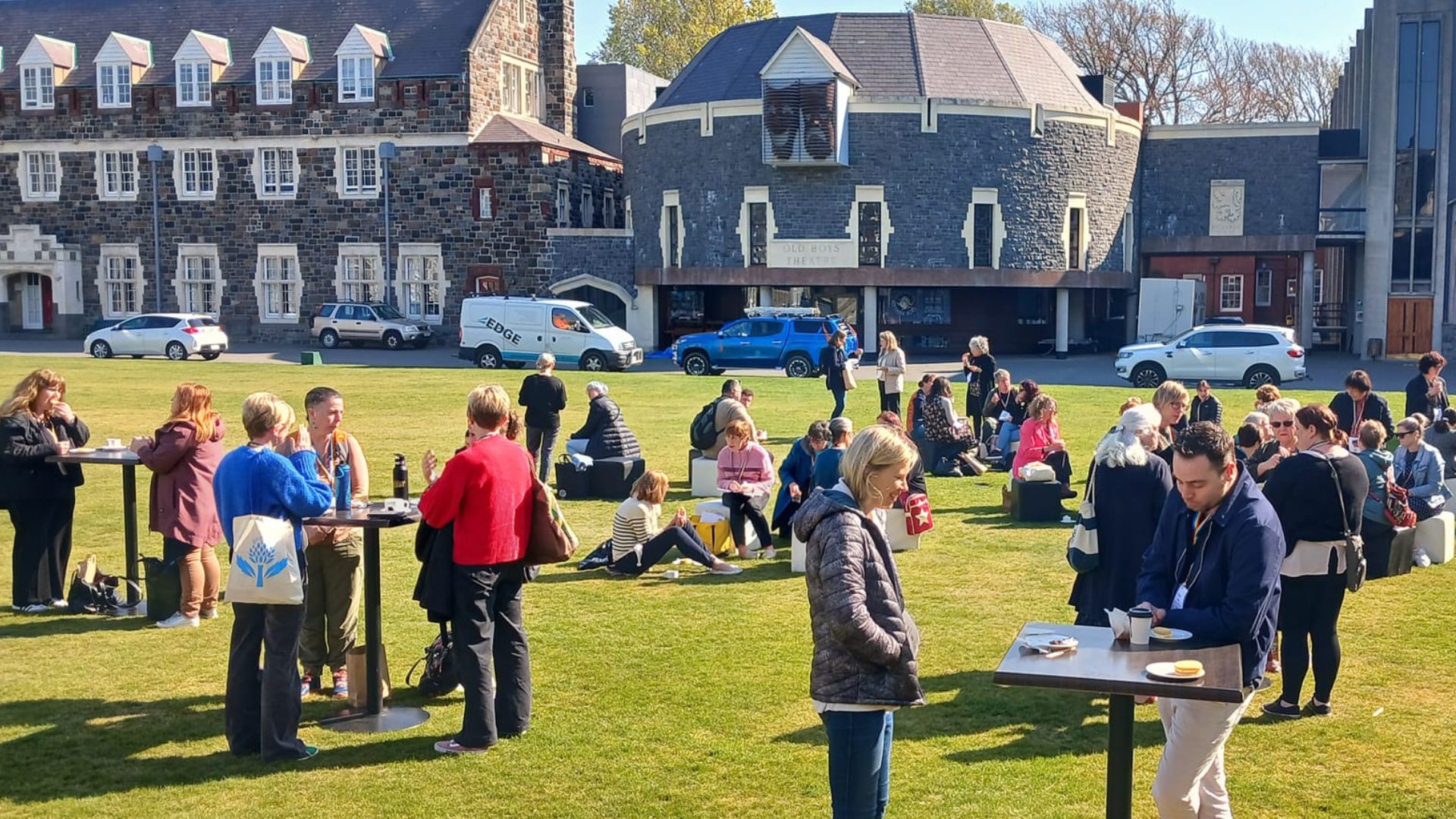
One fabulous benefit of any conference is the ability to network with colleagues. Often librarians feel that they are on an island—many are sole charge in their spaces and do not have the opportunity to network and collaborate on a weekly, or even a monthly, basis. This is an invaluable part of any conference and the SLANZA team certainly maximised the opportunities to connect with fellow librarians and others in the library sector. The scheduled ‘meet your people’ event was a unique way for attendees to connect with different groups such as primary, intermediate or secondary schools, sole charge or library assistant, and those undertaking tertiary studies.
…librarians are fighting just to be helpful.
Reflecting on all that I learned in these three days, I certainly feel more confident and empowered in my role. I left with so many amazing ideas that I am looking forward to bringing into my library. As librarians we fill an integral role in our schools. A school librarian is an amazing resource, brimming with knowledge, empathy, ideas, and support for our kura and our tamariki. Too often this resource is overlooked and librarians are fighting just to be helpful. Gabriel Mace put it best when she encouraged us not to be afraid of the ‘robust’ conversations that may need to happen to have our ideas heard. School librarians grow communities—communities of readers, of whānau, of schools. School librarians develop knowledge—through the currency of our collections, through workshopping literacy skills with staff and students. School librarians build confidence—confidence in reading, confidence in relationships, and confidence in our colleagues and our profession.
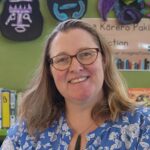
Jess Starr
Jess Starr lives with her husband and two boys in Ruakākā. She loves travelling and going on adventures with her family. When she's not busy adventuring, she loves to spend her afternoons with a great book!



